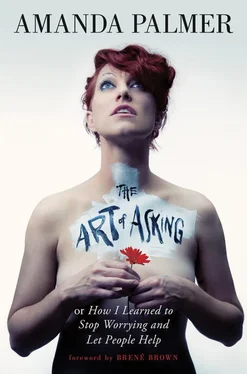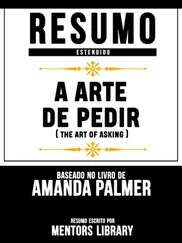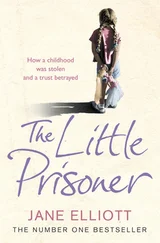Listening fast and caring immediately is a skill in itself. People bring me compact stories: the song that got them through high school, the operation they just had, the recent breakup, the death of a parent. The story about the sick friend who wanted to be at the show but couldn’t make it.
Or the longer, more complicated story about the friend who was supposed to be at the show, but had just committed suicide.
What do you do with news like that? You stop the signing line, you take that person in your arms, you hold them and let them cry for as long as necessary.
Then you get back to work.
• • •
If I had a dollar for every time somebody gave me a CD, I’d have a lot of dollars. Instead, I have a lot of CDs. Years after my front-porch encounter with Edward Ka-Spel, I found myself empathizing with the mountains of tapes that he’d been given on tour.
Can I give you my CD? I’m in a band .
Can I give you my CD? My girlfriend is a singer-songwriter .
Can I give you my CD? I run a death-metal label here in town. I make beats in my bedroom. I make a cappella music on my phone .
The answer is always yes, yes, yes, and yes. I see those CDs as something more than just some local kid trying to get his band a break. They’re like a thank-you letter, a way for one artist to wave a flag to another, like two lighthouses; part of the must-never-stop, ever-circulating gift.
And you do not refuse that gift, ever.
• • •
Whether you’re prepared for it or not, part of the job that goes along with being a confessional songwriter is that you become a makeshift therapist by default. Except you don’t have a nice, quiet office: you’re doing it in loud, dingy nightclubs, in dark alleys outside tour buses, and in backstage bathrooms. I feel simultaneously honored and depressed when someone pulls me close and says, “There’s nobody else I can tell this to…” and proceeds to detail a secret abortion, a rape, a diagnosis of a mental illness.
In that instant of intimate exchange, I want to adopt every teenage kid who tells me their parents kicked them out of the house for being gay. I want to follow the story of every recovery, I want to stick around to see every baby get born and every wound heal and every heart evolve. But I don’t. I can’t. Every night, I drive away.
• • •
You see twenty patients a week. How do you deal with taking in so much pain from strangers? I asked Anthony one night, over the phone as I lay on a pull-out bed in a friend’s living room in Montreal. The post-show signing had taken ages and I was exhausted, but I couldn’t sleep.
Have you ever heard of a “sin-eater”?
No , I said. Tell me .
It’s when a local holy man, or a guru, takes on the sins and sufferings of the community by opening to those who are in pain, and filtering the pain and suffering. He takes all the emotional trash and, through his body, through his love and capacity to stay present, clarifies the pain into compassion. Lots of religions have their version of it. Jesus does it for the Christians .
A community confession-booth attendant, basically , I said.
Ha. Basically. There were professional sin-eaters in England. A guy, for money, would come around and eat bread over the corpse of a dead family member to purge the body of sin before it went to heaven. It’s also the magic and mystery of what we do—when we nail it—in psychotherapy. We take on the suffering of others, digest it, transform it .
And artists? I asked. Sounds like art .
Yeah, good artists do it. You know, the “Artist” and the “Medicine Man” used to be the same guy. “Musician” and “Shaman” used to be the same characters, in a way. Our jobs aren’t that different, you and me. I’ve seen you at the signing line, I’ve watched you. Eat the pain. Send it back to the void as love .
Can I ask you a question?
Ask , he said.
Do you ever have days where you can’t take it all in, and it just makes you too sad?
Yeah, beauty. It happens all the time .
• • •
Sometimes the signing line keeps me from having to be alone.
Sometimes the signing line reminds me that this job isn’t about me, it’s about everybody.
Mostly the signing line makes me feel connected to the people around the fire.
I need to see their faces.
Sometimes I feel like I need the signing line more than they do.
I notice a difference if I don’t sign after a show. It can feel deeply lonely.
Not signing or hanging out after a show is like taking someone home for a one-night stand, having passionate sex with them, and then watching them, from the bed, as they get dressed and leave right after the orgasm. I need the postcoital cuddle, the bit where you spend the night spooning, looking into each other’s eyes with a confirmation that, yes, that happened. And now let’s at least get breakfast and talk about the mundane details of our lives even if we’re probably never going to see each other again.
I hate it when people don’t spend the night.
• • •
Michael Pope and I decided to make a music video—he was a filmmaker, my housemate, and one of my best friends; it made sense—so we picked one of the band’s most popular live songs, “Girl Anachronism,” and co-wrote a treatment sitting at my kitchen table, then spent a week transforming our home into a production house. We asked Ron, the photographer friend of Anthony’s and all-around art enthusiast, to front us the money for film stock (real film stock!). We asked Lee to help decorate the top floor, we asked our housemate Zea to do the costumes, and we asked our fans to volunteer behind the scenes. We fed everybody pizza and beer, and shot for twelve straight hours (we couldn’t afford to rent the equipment for longer than a day), using almost every room of the Cloud Club, along with the back garden and the roof, as our film set. When the video was edited and we put it up on our website (these were pre-YouTube days), everybody in our immediate community had taken part in one way or another. And Lee was ecstatic: this was how he always imagined the space being used. We went on to shoot full-scale music videos in the house, and at my parents’ house, and at Ron’s house, and at my old high school, using the drama students. Through the act of asking, we created our community. That’s how it worked.
• • •
Our audience was growing. We sent hundreds of packages to hundreds of labels. Nobody wanted us. We finally decided that we should stop running a CD-toasting business out of my kitchen and make our own legitimate studio record. On our own, no label. If we printed a few thousand copies, the whole undertaking would cost us about $20,000, including the studio time, and then we’d have a high-quality CD with all of our songs to sell at shows, and make the money back.
But we didn’t have that kind of money. We were making a few hundred dollars here and there from gigging, but even when combined with our incomes from stripping, statue-ing, and scooping ice cream, that didn’t leave us with more than a few thousand dollars at a time, and we still had to get around, pay rent, buy food.
We did have a growing fanbase and a hardcore work ethic, though, and I figured that was decent enough collateral to guarantee a few personal loans. I made a short list of people, and then one by one, I asked them: Ron Nordin, Anthony’s best friend, a photographer and local arts enthusiast; my parents; our New York couchsurfing hosts Josh and Alina; a generous uncle who lived in Los Angeles. And we asked Tom and Steve, a gay couple who came to almost all of our gigs, lived in a house, and appeared to have real jobs. I asked everyone if they would pitch in up to $5,000 for the recording and printing of the record, with the promise that we would pay the money back within a year, sooner if possible.
Читать дальше












